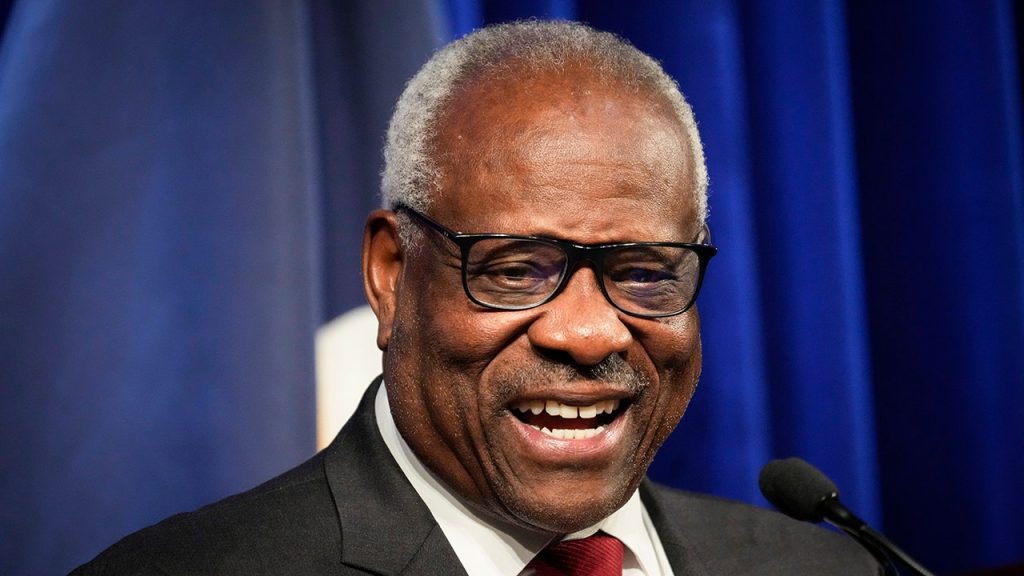Supreme Court Justice Clarence Thomas was born in Pin Point, Georgia on June 23, 1948. Raised in extreme poverty, Thomas was sent to live with his maternal grandfather following his parents’ divorce and his father’s departure. Thomas titled his 2008 memoir “My Grandfather’s Son” in honor of the profound impact his grandfather had on his life. Thomas attended segregated Catholic schools for Black children and faced racially charged bullying throughout his education. Despite this, he excelled academically and graduated cum laude from the College of the Holy Cross in 1971, and from Yale Law School in 1974.
During the 1970s and 1980s, Thomas held various roles, including assistant secretary for civil rights at the U.S. Department of Education and chairman of the U.S. Equal Opportunity Commission. In 1990, he became a judge on the United States Court of Appeals for the District of Columbia Circuit. Thomas was appointed as an associate justice on the Supreme Court by President George H. W. Bush in 1991 following the retirement of Justice Thurgood Marshall. After a contentious confirmation hearing, Thomas was approved by the Senate and seated on the court at age 43. Throughout his time on the Supreme Court, Thomas has typically associated with the conservative wing of the court.
Thomas is married to Virginia “Ginni” Thomas and has one son, Jamal, from a previous marriage. Mark Paoletta, a close friend and co-author of the book “Created Equal: Clarence Thomas in His Own Words,” believes that Thomas will be considered one of the greatest justices in history. Paoletta describes Thomas as a courageous justice who faithfully applies the Constitution and the text of statutes, regardless of the outcome. Thomas’ Martin-Quinn score during the 2021-2022 term was the most conservative of anyone on the court, highlighting his ideological stance.
Throughout his career, Thomas has faced adversity and challenges, from his early life in poverty to the racially charged environments he encountered in school. Despite these obstacles, he persevered and excelled in his education and legal career. Thomas’ legacy as a Supreme Court justice will be defined by his commitment to applying the Constitution faithfully and his courage in standing by his convictions. His journey from humble beginnings to the highest court in the land is an inspiration to many and a testament to his resilience and determination.
Born on June 23, 1948, in Pin Point, Georgia, Supreme Court Justice Clarence Thomas overcame extreme poverty and racial adversity to become the second Black member of the Supreme Court. Raised by his maternal grandfather, Thomas attended segregated Catholic schools and faced racially charged bullying throughout his education. Despite these challenges, Thomas excelled academically, graduating cum laude from the College of the Holy Cross in 1971 and Yale Law School in 1974. He held various roles in government before being appointed to the Supreme Court by President George H. W. Bush in 1991.
Prominent throughout his time on the Supreme Court has been Thomas’ conservative-leaning ideology and commitment to applying the Constitution faithfully. His 2021-2022 Martin-Quinn score, a metric used to gauge justices’ ideologies based on their voting record, was the most conservative on the court. Thomas’ legacy, as described by his close friend and co-author Mark Paoletta, is that of a courageous justice who remains true to his convictions and steadfast in his interpretation of the law. Despite facing adversity throughout his life and career, Thomas has remained resilient and determined in his pursuit of justice and equality.
In his early life, Clarence Thomas was deeply influenced by his grandfather, whom he called “Daddy” and credited as his hero. Thomas’ family grappled with poverty, and he faced challenges in his education due to racial animus. However, he persevered and excelled academically, eventually graduating from Yale Law School and embarking on a successful legal career. Thomas has been recognized for his steadfast commitment to upholding the Constitution and applying statutes faithfully, even in the face of controversy and adversity. His journey from humble beginnings to the Supreme Court exemplifies his resilience and determination in the pursuit of justice.
Clarence Thomas’ impact on the Supreme Court, and American jurisprudence more broadly, cannot be understated. As the second Black member of the court, Thomas has played a significant role in shaping legal decisions and upholding the principles of the Constitution. His tenure has been marked by a commitment to conservative principles and a willingness to stand by his convictions, even in the face of opposition. Thomas’ legacy will be remembered as that of a courageous justice who remained true to his beliefs and principles throughout his career, inspiring others to follow in his footsteps and uphold the rule of law.


